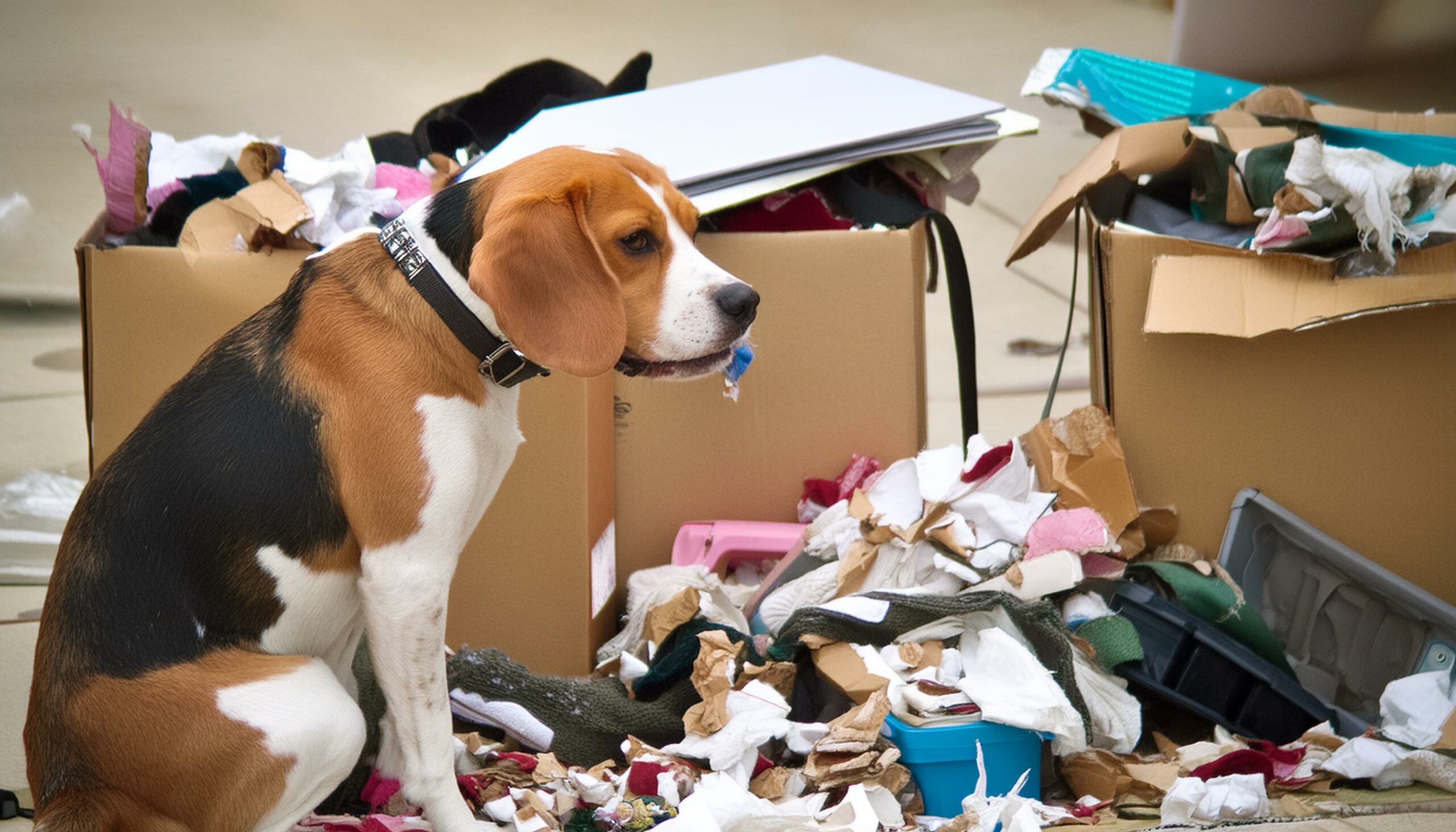Beagles, those charming and lovable dogs with their signature floppy ears and wagging tails, often bring joy to households around the world. However, alongside their endearing traits, Beagle owners may encounter a common challenge: their propensity to destroy things. From gnawed furniture to chewed-up shoes, the list of casualties can be extensive. But what drives Beagles to engage in such destructive behavior? Let’s explore the underlying reasons and discover how to address this issue.
Natural Instincts
Hunting Instincts
Beagles are descendants of hunting dogs, bred for their keen sense of smell and tracking abilities. This ancestry instills in them a strong instinct to hunt and chase prey. Even in domestic settings, Beagles may exhibit behaviors like digging and chewing as a manifestation of their innate hunting instincts.
Pack Mentality
Being pack animals by nature, Beagles thrive on social interaction and companionship. When left alone for prolonged periods, they may experience feelings of loneliness and separation anxiety. Destructive behavior can sometimes be a way for them to cope with these emotions and assert their presence within the household.
Boredom and Lack of Stimulation
High Energy Levels
Beagles are energetic dogs that require regular exercise to maintain their physical and mental well-being. Without sufficient opportunities to burn off excess energy, they may become restless and seek out alternative ways to entertain themselves, often resorting to destructive activities.
Need for Mental Stimulation
In addition to physical exercise, Beagles also need mental stimulation to keep their curious minds engaged. Without adequate mental challenges, they may become bored and frustrated, leading to destructive behaviors as a means of relieving boredom and seeking stimulation.
Separation Anxiety

Strong Attachment to Owners
Beagles form strong bonds with their owners and become deeply attached to them. When separated from their human companions, they may experience separation anxiety, characterized by distress and anxiety. Destructive behavior can be a manifestation of their attempts to alleviate these feelings of anxiety and insecurity.
Stress When Left Alone
Being left alone for extended periods can be stressful for Beagles, particularly if they are not accustomed to it or if it disrupts their routine. This stress can trigger destructive behaviors as a coping mechanism, providing a temporary outlet for their pent-up emotions.
Teething and Chewing
Exploring the World
Like all puppies, Beagle puppies go through a teething phase during which they explore the world by chewing on objects. Chewing helps alleviate the discomfort of teething and allows them to investigate their surroundings. However, if not provided with appropriate chew toys, they may turn to household items as substitutes.
Soothing Teething Discomfort
Chewing also serves as a natural way for Beagle puppies to soothe their teething discomfort. The act of gnawing on objects provides relief for their sore gums and can become a comforting habit. To prevent destructive chewing, it’s essential to offer them suitable teething toys and supervise their chewing behavior.
Attention-Seeking Behavior

Desire for Interaction
Beagles are social animals that thrive on human interaction and companionship. When they feel neglected or ignored, they may resort to destructive behavior as a way to attract attention and engage with their owners. Chewing on household items can be their way of signaling their need for interaction.
Seeking Attention When Neglected
If Beagles do not receive adequate attention or mental stimulation, they may resort to attention-seeking behaviors, including destructive chewing. By destroying items in the home, they may elicit a response from their owners, albeit a negative one. Consistent attention and interactive playtime can help address this behavior.
Lack of Training
Importance of Proper Training
Proper training is crucial for Beagles to learn appropriate behaviors and boundaries. Without consistent training and reinforcement, they may develop destructive habits that are challenging to break. Training should focus on teaching them what is acceptable to chew and providing alternatives to forbidden items.
Establishing Boundaries and Rules
Clear boundaries and consistent rules help Beagles understand what is expected of them and prevent unwanted behaviors. Owners should set limits on where their Beagles are allowed to go and what items they are allowed to chew. Positive reinforcement techniques, such as praise and rewards, can reinforce desired behaviors.
Environmental Factors

Stressful Environments
Changes in the household environment, such as moving to a new home or the addition of new family members, can be stressful for Beagles. These changes can disrupt their sense of security and trigger anxiety, leading to destructive behaviors as a coping mechanism.
Changes in Routine
Beagles thrive on routine and may become anxious or unsettled when their daily schedule is disrupted. Changes in routine, such as alterations to feeding times or walking routes, can cause stress and prompt destructive behaviors. Maintaining a consistent routine can help alleviate their anxiety.
Health Issues
Dental Problems
Dental issues, such as teething pain or dental disease, can cause discomfort for Beagles and lead to destructive chewing behavior. Regular dental care, including teeth cleaning and dental exams, is essential for maintaining their oral health and preventing dental-related issues.
Digestive Issues
Digestive problems, such as gastrointestinal discomfort or dietary intolerances, can also contribute to destructive behaviors in Beagles. Chewing on objects may provide them with temporary relief from digestive discomfort or serve as a way to alleviate boredom. Identifying and addressing underlying health issues is crucial for preventing destructive habits.
Preventive Measures
Providing Adequate Exercise
Regular exercise is essential for Beagles to expend their energy in a positive manner and prevent boredom-related behaviors. Daily walks, interactive play sessions, and engaging activities, such as agility training or scent games, can help keep them physically and mentally stimulated.
Mental Enrichment Activities
In addition to physical exercise, Beagles benefit from mental enrichment activities that challenge their cognitive abilities and keep them mentally sharp. Puzzle toys, interactive feeders, and obedience training sessions are excellent ways to provide mental stimulation and prevent boredom-induced destructive behaviors.
Proper Training and Socialization
Early socialization and obedience training are essential for Beagles to learn appropriate behaviors and manners. Positive reinforcement techniques, such as clicker training or treat rewards, can help reinforce desired behaviors and discourage destructive habits. Consistency and patience are key when training Beagles.
Redirecting Behavior

Using Chew Toys and Puzzles
Providing Beagles with a variety of chew toys and puzzle feeders can redirect their chewing behavior onto acceptable objects. Interactive toys that dispense treats or challenge their problem-solving skills can keep them occupied and prevent them from resorting to destructive chewing.
Positive Reinforcement
Rewarding Beagles for desirable behaviors with praise, treats, or toys reinforces positive habits and encourages them to repeat those behaviors. Positive reinforcement helps strengthen the bond between owners and Beagles while promoting obedience and good manners. Consistency and patience are essential when using this training method.
Seeking Professional Help
Consultation with a Veterinarian
If destructive behaviors persist despite preventive measures, it may be necessary to seek advice from a veterinarian. A thorough physical examination can help rule out any underlying medical issues contributing to the behavior. The veterinarian may also provide guidance on behavior modification techniques or recommend medication to alleviate anxiety.
Behavioral Training Programs
Enrolling Beagles in behavioral training programs or working with a certified dog trainer can provide additional support and guidance in addressing destructive behaviors. These programs often utilize positive reinforcement techniques and behavior modification strategies tailored to the individual dog’s needs. Professional trainers can offer valuable insights and practical solutions for managing and redirecting destructive behavior.
Conclusion
Understanding why Beagles engage in destructive behaviors is the first step toward addressing and preventing this issue. By recognizing the underlying reasons behind their actions and implementing preventive measures, owners can help their Beagles lead happier, healthier lives without resorting to destructive habits. With patience, consistency, and proper training, Beagle owners can foster a strong bond with their furry companions and enjoy a harmonious relationship built on trust and mutual respect.
Unique FAQs
How can I stop my Beagle from destroying things when I’m not home?
Providing ample exercise, mental stimulation, and appropriate chew toys can help alleviate boredom and prevent destructive behaviors when left alone.
My Beagle chews on everything, including furniture and shoes. What should I do?
Redirect your Beagle’s chewing behavior onto acceptable chew toys and provide plenty of mental enrichment activities to keep them engaged and entertained.
Will neutering or spaying my Beagle help reduce destructive behavior?
Neutering or spaying may help reduce certain behaviors influenced by hormones, but it’s essential to address underlying causes such as boredom, anxiety, or lack of training.
Can separation anxiety cause my Beagle to destroy things?
Yes, Beagles are prone to separation anxiety and may exhibit destructive behaviors as a result of stress and loneliness when left alone.
How long does it take to train a Beagle to stop destroying things?
Training a Beagle requires patience, consistency, and positive reinforcement. The timeline for stopping destructive behaviors varies depending on the individual dog and the effectiveness of training methods.
